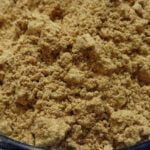Ingredient Name: Fenugreek Fenugreek, scientifically known as Trigonella foenum-graecum, is an herb with culinary and medicinal uses. It belongs to the Fabaceae family and is native to the Mediterranean region, Southern Europe, and Western Asia. Fenugreek has a rich history of traditional use in various cultures for its health benefits and as a spice in cooking.
Scientific Name: Trigonella foenum-graecum Fenugreek is botanically known as Trigonella foenum-graecum. It derives its name from the Latin words “trigonum” and “graecum,” which mean “triangle” and “Greek,” respectively. The name refers to the plant’s triangular-shaped yellowish-brown seeds.
Types of Fenugreek: There is primarily one type of fenugreek, which is Trigonella foenum-graecum. However, within this species, different varieties or cultivars may exist with minor variations in appearance and taste.
Origin: Fenugreek has a long history of cultivation and use in various regions. It is believed to have originated in the Mediterranean region, specifically in the countries surrounding the eastern Mediterranean. Today, it is cultivated in several countries worldwide, including India, Egypt, Morocco, and China.
Role of Fenugreek in Male Sexual Wellness:
- Enhanced Libido: Fenugreek has been traditionally used as an aphrodisiac to enhance male libido and sexual desire. It may stimulate the production of certain hormones that play a role in sexual arousal and performance.
- Testosterone Support: Fenugreek may have a positive impact on testosterone levels, a key hormone in male sexual health. Studies suggest that fenugreek supplementation may help increase free testosterone levels, leading to improved sexual function.
- Erectile Function: Fenugreek’s potential to improve blood flow may positively affect erectile function. By promoting healthy blood circulation, fenugreek could aid in achieving and maintaining erections.
- Sperm Health: Some research indicates that fenugreek may have beneficial effects on sperm health, including increased sperm count, motility, and morphology. These factors are crucial for male fertility.
- Prostate Health: Fenugreek may support prostate health, as it contains bioactive compounds with anti-inflammatory properties. By reducing inflammation, fenugreek may contribute to overall prostate well-being.
Role of Fenugreek on Human Health:
Digestive System:
- Digestive Health: Fenugreek seeds are an excellent source of soluble fiber, which plays a vital role in aiding digestion and preventing constipation. The fiber absorbs water, adding bulk to the stool and promoting regular bowel movements. Additionally, fenugreek can provide relief from indigestion and heartburn by soothing the gastrointestinal tract.
- Appetite Regulation: Fenugreek has shown promise in regulating appetite and controlling overeating. The soluble fiber in fenugreek can create a feeling of fullness, reducing the desire to overindulge in food. This property makes it potentially beneficial for weight management and can support those trying to maintain a healthy weight.
Cardiovascular System:
- Cholesterol Management: Fenugreek has demonstrated the ability to lower total cholesterol and LDL cholesterol levels, commonly known as “bad cholesterol.” By reducing cholesterol levels, fenugreek contributes to cardiovascular health and helps lower the risk of heart disease.
- Blood Pressure Regulation: Studies suggest that fenugreek supplementation may help lower high blood pressure levels. Hypertension, or high blood pressure, is a risk factor for cardiovascular diseases. Fenugreek’s potential to support blood pressure regulation can positively impact heart health.
Endocrine System:
- Blood Sugar Control: Fenugreek shows promise in improving insulin sensitivity and reducing blood sugar levels. Its bioactive compounds help slow down the absorption of sugar in the intestines and may enhance the utilization of glucose in the body. This makes fenugreek beneficial for individuals with diabetes or those at risk of developing the condition.
- Hormonal Balance: Fenugreek may influence the balance of certain hormones, such as testosterone and estrogen. While more research is needed, preliminary studies suggest that fenugreek may help regulate hormone levels, which can have a broad impact on various aspects of health and well-being.
Respiratory System:
- Mucolytic Properties: Fenugreek seeds contain compounds with mucolytic properties, meaning they help break down and expel mucus from the respiratory tract. This makes fenugreek beneficial for easing respiratory congestion and relieving symptoms associated with conditions like bronchitis or the common cold.
- Asthma Management: Some studies indicate that fenugreek may have anti-inflammatory effects that can help manage asthma symptoms. Asthma is characterized by airway inflammation, and fenugreek’s anti-inflammatory properties may provide relief to individuals with asthma.
Immune System:
- Antioxidant Activity: Fenugreek seeds are rich in antioxidants, such as flavonoids and polyphenols, which help neutralize harmful free radicals in the body. By reducing oxidative stress, fenugreek supports a healthy immune system and helps protect the body against various diseases.
- Immunomodulatory Effects: Fenugreek may have immunomodulatory properties, meaning it can regulate and enhance immune responses. These effects could help improve the body’s ability to defend against infections and illnesses.
Nervous System:
- Brain Health: Fenugreek contains compounds with potential neuroprotective effects, which means they may help protect brain cells from damage and support overall brain health. These compounds could play a role in promoting cognitive function and memory.
- Stress Reduction: As an adaptogen, fenugreek may help the body cope with stress and reduce stress-related symptoms. By modulating certain physiological responses to stress, fenugreek can contribute to improved emotional well-being.
Reproductive System:
- Female Reproductive Health: Fenugreek has been used traditionally to regulate the menstrual cycle and alleviate menstrual discomfort in some women. It may help balance hormone levels and reduce symptoms like menstrual cramps.
- Galactagogue Properties: Fenugreek is commonly used as a galactagogue, which is a substance that promotes milk production in breastfeeding women. It is believed to enhance prolactin levels, a hormone responsible for milk production, and thus supports breastfeeding mothers.
Skeletal System:
- Bone Health: Fenugreek contains essential minerals such as calcium and magnesium, which are crucial for maintaining healthy bones. Adequate intake of these minerals can contribute to stronger bones and reduce the risk of osteoporosis.
- Anti-Inflammatory Effects: Fenugreek’s anti-inflammatory properties may be beneficial for individuals with joint discomfort. By reducing inflammation, fenugreek can alleviate joint pain and support overall joint health.
Integumentary System:
- Skin Health: Fenugreek has been used topically to address various skin conditions, including acne and eczema. Its anti-inflammatory and antimicrobial effects may help reduce skin inflammation and fight against bacterial infections.
- Hair Health: Fenugreek seeds are often used in hair care products due to their potential to promote hair growth and reduce hair loss. Fenugreek seeds contain proteins and nicotinic acid that can nourish hair follicles and strengthen hair strands.
Urinary System:
- Diuretic Properties: Fenugreek may act as a diuretic, promoting increased urine production and supporting kidney function. This property can aid in flushing out toxins from the body and reducing water retention.
- Urinary Tract Health: Fenugreek’s antimicrobial effects may be beneficial for maintaining urinary tract health and preventing urinary tract infections. Its ability to combat harmful bacteria may support a healthy urinary system.
Vegetarian/Vegan Status: Fenugreek is a plant-based herb, making it suitable for vegetarians and vegans.
Supportive Studies or Trials on Male Sexual Wellness:
- Study on Fenugreek Supplementation for Low Libido: A study published in the Journal of Sexual Medicine investigated the effects of fenugreek supplementation on male sexual wellness. The study involved men with low libido, and the results showed that fenugreek supplementation was associated with increased sexual desire and improvements in sexual function. This suggests that fenugreek may have aphrodisiac properties and could be beneficial for individuals experiencing a decrease in sexual interest.
- Study on Fenugreek Extract and Testosterone Levels: Another study reported in Phytotherapy Research examined the impact of fenugreek extract on testosterone levels in healthy men. The results indicated that fenugreek extract significantly improved testosterone levels, which can have a positive effect on male sexual function. The increase in testosterone may contribute to enhanced libido and sexual performance.
- Clinical Trial on Fenugreek Extract and Age-Related Sexual Concerns: In a randomized, double-blind, placebo-controlled trial, researchers investigated the effects of fenugreek extract on age-related sexual concerns in men. The trial found that fenugreek extract positively influenced sexual arousal, orgasm, and satisfaction in men experiencing age-related sexual issues. This suggests that fenugreek may have a role in supporting overall sexual wellness in aging men.
- Study on Fenugreek Extract and Male Infertility: A study published in the International Journal of Medical Sciences focused on the effects of fenugreek extract on male infertility. The results revealed that fenugreek extract improved sperm count and motility in infertile men. This suggests that fenugreek may have a potential role in supporting male reproductive health and addressing infertility concerns.
- Research on Fenugreek’s Impact on Testosterone and Sexual Function: Research published in the Journal of Ethnopharmacology explored the impact of fenugreek on testosterone levels, sperm parameters, and sexual function in men with androgen deficiency. The findings showed that fenugreek had a positive impact on testosterone levels and sperm parameters, which could contribute to improved sexual function in men with androgen deficiency. This indicates fenugreek’s potential in supporting male sexual health and hormonal balance.
Safety and Side Effects: Fenugreek is generally safe when consumed in moderate amounts as a spice or supplement. However, some individuals may experience mild digestive discomfort, such as bloating or gas. Pregnant women should avoid high doses of fenugreek, as it may stimulate uterine contractions.
Sustainability & Dosage as per FSSAI: Fenugreek is a widely cultivated herb and is not considered endangered. As for dosage, the recommended amount of fenugreek supplement can vary based on the specific product and its concentration. It is essential to follow the dosage instructions provided by the manufacturer or consult a healthcare professional.
Summary: Fenugreek, scientifically known as Trigonella foenum-graecum, is an herb with diverse health benefits. It is well-regarded for its positive effects on male sexual wellness, including enhanced libido, testosterone support, and improved erectile function. Additionally, fenugreek offers numerous advantages for overall human health, such as digestive support, cardiovascular health, and immune system support. It has antioxidant, anti-inflammatory, and adaptogenic properties that contribute to its medicinal value. Fenugreek is safe for most people when consumed in moderation, but pregnant women should exercise caution. With its varied uses and potential health benefits, fenugreek continues to be a valuable herb in traditional and modern medicine.







